In the winter of 330 BC, after a brilliant victory at Gaugamela, Alexander the Great de facto controlled most of the Achaemenid Empire and was persecuting King Darius III, who, taking refuge in Ecbatana, tried to organize a new army with which to resist. But he needed time and the one designated to provide it was the satrap Ariobarzanes, who prepared an ambush in a place called the Persian Gate. It was a narrow gorge in which, paradoxically emulating the Spartans of Leonidas at Thermopylae, he managed to resist for a month, until, as Ephialtes did in that episode, a shepherd revealed to the Macedonian a route to circumvent the danger.
Indeed, the battle of the Persian Gate bears more than one similarity to that of Thermopylae, albeit with the opposite contenders:resistance to an invasion, diversion to prepare a more consistent defense elsewhere, a small number of soldiers against a a much higher contingent, the betrayal of a local pastor… In reality, these are typical and recurrent elements that, beyond what is more or less true, are repeated throughout history in those military contexts; let us remember that the same thing happened in Las Navas de Tolosa, for example.
In this case, we are talking about that eternal Macedonian campaign that the son of Philip II initiated against Persia with a double purpose:to avenge the ancient Persian attempts to invade Greece and to unite all the Hellenes in a common enterprise against a foreign enemy -another resource classic in war history-, to which should be added both the political-economic interest -taking over the trade routes in the Aegean and the interior of Asia Minor- as well as the personal ambition and desire for glory of the protagonist.

Alexander crossed the Hellespont in 334 BC. and he was defeating one after another all the Achaemenid armies that came his way in the Granicus, Issos and Gaugamela, seizing on his way the territory of the empire from Anatolian Greece to Babylon, passing through Egypt, Phoenicia and Judea. Advancing along the Persian Royal Road (a causeway built by Darius I two centuries earlier to connect the nerve points of his domain), he reached Susa, the religious capital, and set his sights on Persepolis, the political one. Before there was Pasargadae, the ancient capital of Cyrus the Great , whose taking would leave most of the territory under his control.
Darío III also saw it that way, who, fleeing to the East from the Gaugamela disaster, had settled in Ecbatana (a region located half a thousand kilometers west of present-day Tehran), where he was immersed in the task of recruiting men to form a new army with which to stop the invader -the vast extension of the Achaemenid Empire represented a practically inexhaustible quarry-, for which he had to entertain Alexander as long as possible. The mission fell to a man he trusted, Ariobarzanes, satrap of the region of Persia (what today are the Iranian provinces of Fars and Bushehr). 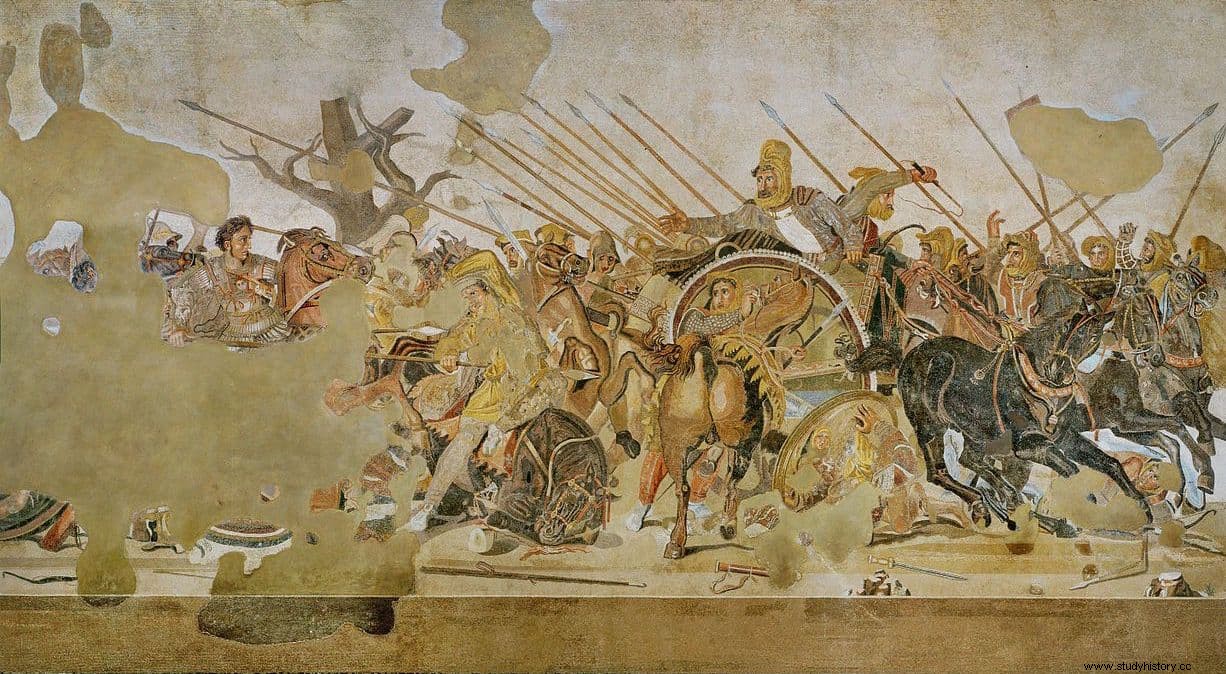
Ariobarzanes, born on an uncertain date around the year 368 BC, was in charge of that satrapy from 335, something that surprises historians a bit because said administrative unit did not exist until then, which makes them deduce that the monarch wanted having someone close - it is believed that they were relatives or friends - taking care of that area in their absence; after all, two of the most important cities of the empire were located there, the aforementioned Persepolis and Pasargadae. In addition, Ariobarzanes had experience in dealing with the Macedonians because he participated in the battle of Gaugamela in command of a contingent of soldiers from the Persian Gulf.
Between him and Alexander stood a natural obstacle, the Zagros Mountains, the longest mountain range in the modern countries of Iran and Iraq:1,500 kilometers from Iraqi Kurdistan to the Strait of Hormuz. These characteristics prevented surrounding the Zagros, forcing them to cross, something of considerable difficulty if one takes into account that the average altitude in the Fars area is around four thousand meters. Ariobarzanes, who knew the region, studied the terrain and concluded that the enemy would choose the Persian Gate to pass through.
The Persian Gate (or Persian Gates) is the name of a narrow gorge located in the southern part of Mount Dena (Kuh-e-Dinar), the top of the mountain range with four thousand four hundred nine meters. Today a mountain road built in 1990 passes through there, but in the past you had to make your way on foot in the middle of the snow and low temperatures -Alexander's campaign was in the middle of January-, with the extra interest for the satrap that the width barely exceeded two meters at its narrowest part. An ideal point, then, to lay an ambush with few troops; Ariobarzanes thought that Alejandro would have no choice but to go through there because the other ports were worse.
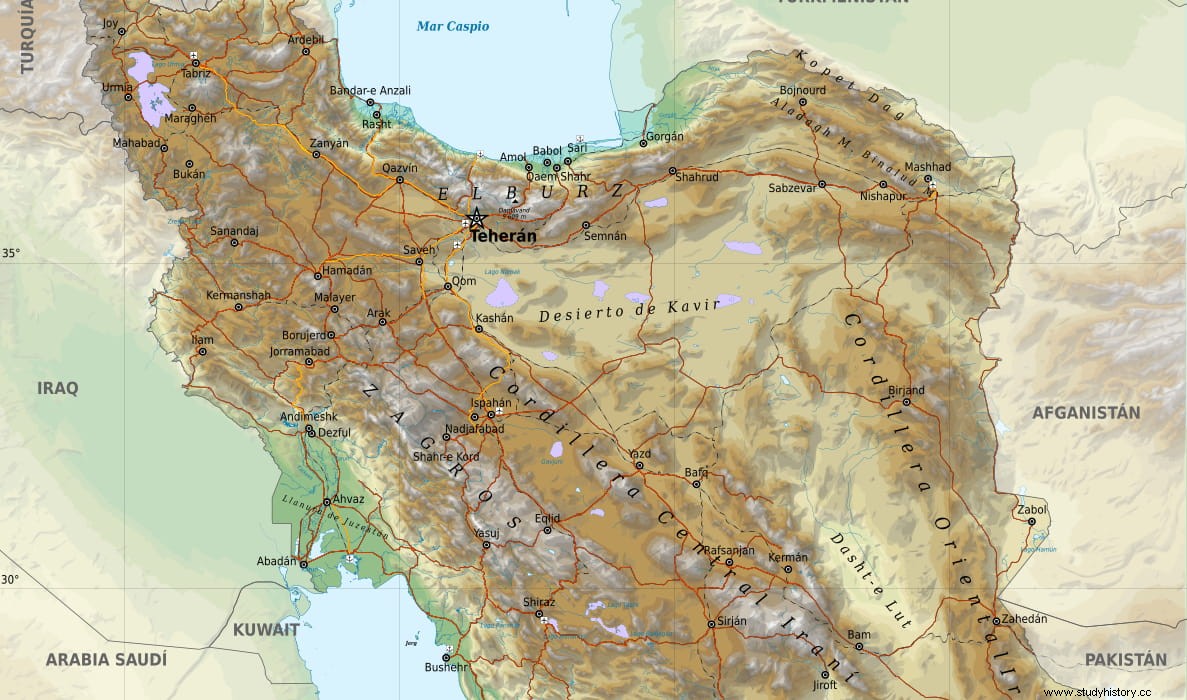
To cross the Persian Gates, the inhabitants of the place demanded a toll in concept of authorization of passage, a privilege granted by the King of Kings to ensure the mobility of his troops and couriers. They were the Uxii, a non-Iranian people, perhaps from Khuzistan (southwestern Iran) and probably related to the Elamites, who constituted a tribal confederation divided into two groups:one sedentary living on the plains and the other nomadic living in the the mountains, although both dedicated to sheep grazing.
In the year 330 BC, their chief was Madiates, perhaps not Uxii by birth but Persian and surely a relative of Darius III; in fact, he was married to a niece of the king's mother, the famous Sisigambis, who does seem to have been an uxii. For all these reasons, he had the duty to face Alexander and that is how he arranged everything, although the people, apparently, did not see it so clearly and were reluctant to face an invincible adversary until then.
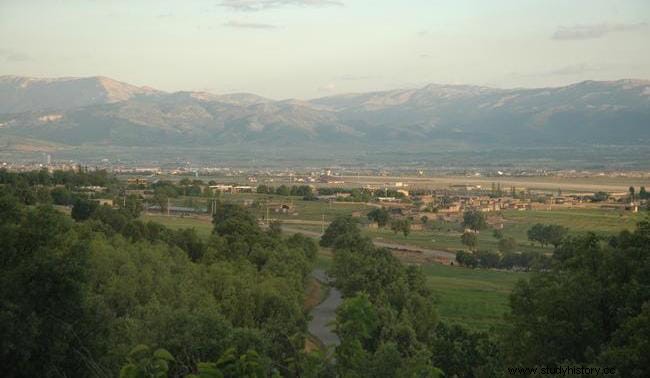
And that the Macedonian did not come with all his strength. He had divided his troops in two, handing over the command of one to Parmenion, an all-round general who had already served Philip and, consequently, led the left flank in Granicus, Issus and Gaugamela, as well as being the father of Philotas, Alexander's right-hand man. as hipparchus , i.e. cavalry commander of the Heitaroi , the elite of that troop (ironically, father and son would be accused of treason shortly after and executed). Parmenion was to continue along the Persian Royal Road with the baggage train, while Alexander led the rest - between fourteen and seventeen thousand men - a little further north, to pass through the Zagros.
This partition was common in the movements of the Great through occupied countries, since with it he hoped to facilitate supplies. But Ariobarzanes was aware of this and also split his own, sending a column to intercept Parmenion. At least that is what can be deduced from the delay of the Macedonian veteran in traveling the distance between Susa and Persepolis, which normally took three weeks along that road, but he needed considerably more. Of course, with it the Persian army was also diminished; his boss hoped the terrain would make up for it, playing in his favour.
Alexander's envoys agreed with the Uxii to meet in a place to pay the toll, but it was nothing more than a maneuver to make them trust. That same night, led by local people of other ethnic groups, eight thousand Macedonians fell on the village and captured the families of the warriors, who were absent because they had moved to the agreed place. Next, Alexander unleashed an attack against them, pushing them towards the troops of General Craterus, who had previously, taking advantage of the darkness, placed himself behind, surrounding them.
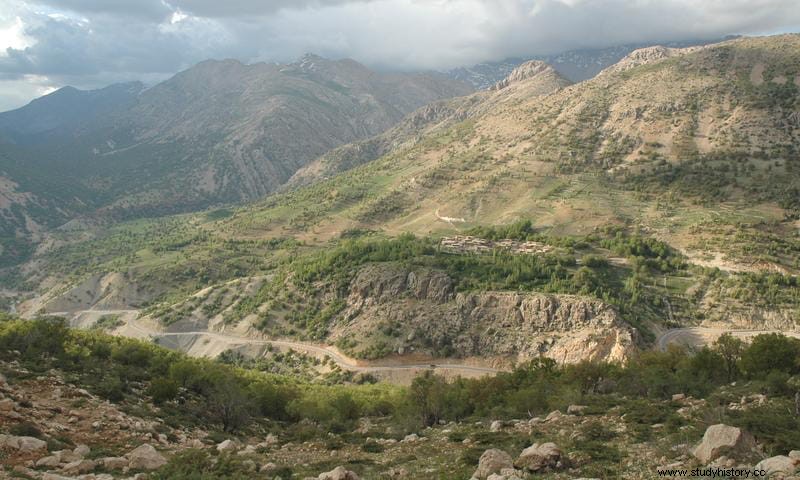
The uxii were defeated and those who did not fall fighting surrendered following the order of Madiates. Earlier, she sent a courier to her mother-in-law Sisigambis to intercede with Alexander, just as she had done for her family when she fell prisoner after the defeat at Issos. The queen mother, in fact, mediated and got the Macedonians to forgive the Uxii and leave them their land in exchange for an annual tribute, consisting of a hundred horses, half a thousand oxen and thirty thousand sheep.
Reversing the roles immediately above, the one who trusted now was Alexander, who thought that this was the entire force sent by Darius against him. Thus, believing that there would be no more obstacles in his way, he resumed his march without taking precautionary measures or overtaking explorers, carelessly entering the gorge despite the fact that it was narrowing more and more until reaching barely two meters in its middle section, right where there was a curve to the southeast, present-day Tang'e Meyran. And precisely there, in what is now the village of Cheshmeh Chenar, he had taken Ariobarzanes positions.
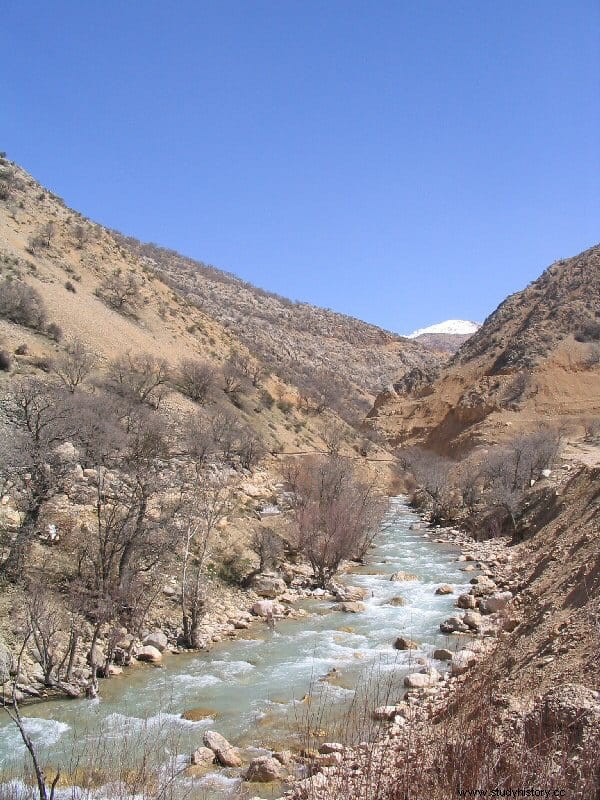
The Persian soldiers spread out along the tops of the vertical walls, having the enemy at their mercy in the background. Lucius Flavius Arrian says that there were forty thousand infantry and seven hundred horsemen, Quintus Curtius reviews twenty-five thousand and Diodorus Siculus somewhat less than eighteen thousand plus three hundred horsemen, although historians believe they see them as an exaggeration to increase Alexander's merit and lower the number of infants to about two thousand, maximum. Ariobarzanes waited for the bulk of the enemy to reach the Persian Gate, where he would find that he could not continue advancing, since he had ordered the construction of a wall or barricade.
The Macedonian army had advanced almost three miles down this dangerous gorge and their men were beginning to pile up in disorder before the unexpected barrier when Ariobarzanes gave the order to attack. A hail of stones and arrows suddenly rained down on the Greeks, inflicting heavy casualties on them and threatening to overwhelm them with a single blow, as they were unable to respond. Finding it impossible to adopt an adequate formation, due to the curve and the chaos formed by the fusion between the vanguard and the rear, Alexander ordered the retreat, which became a man for himself in which the dead and wounded were forgotten on the battlefield.
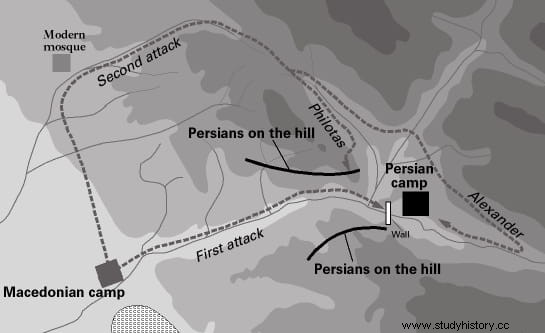
The situation was stalled for a month. It was then that the providential shepherd appeared, who other versions turn into simple Persian prisoners. If we accept the first, that man turned out to have a Persian mother but a Lycian father (Lydia was a Hellenic kingdom in Anatolia), so he had no problem showing the Macedonians a path twenty kilometers back that would allow them to surround the enemy and surprise him from behind. That night Alexander left Craterus at the Persian Gate with the bulk of the troop and instructions to light many torches to simulate everyone camping there, while he retreated with a light column to take the new route.
Once the roundup was complete, he subdivided his men into two groups, one led by himself and the other by Philotas who, at dawn, simultaneously attacked the Persians from the rear and one flank, while Craterus, duly warned by a trumpet blast, , did the same in front. The triple clamp and, above all, the surprise, were a catastrophe for Ariobarzanes, who saw how his soldiers suffered an unexpected defeat; among those who fell was his own sister, the warrior Youtab.
Seeing his plan foiled and the battle lost, the satrap valiantly launched a desperate charge against the Macedonian lines rather than surrender. Some sources say that he perished in the attempt, while Arriano says that he managed to escape with just forty of his own and later surrendered. Others believe that he sought refuge in Persepolis, where Tiridates, the governor of the city, denied him entry, either because he understood that all resistance was useless, or because he had reached an agreement with Alexander's envoys, and he died fighting before the walls. of the city To replace him, Alexander appointed Phrasaortes, son of Reomitres (veteran of the Granicus and Issos -in this last battle he died-, who had already been a satrap).
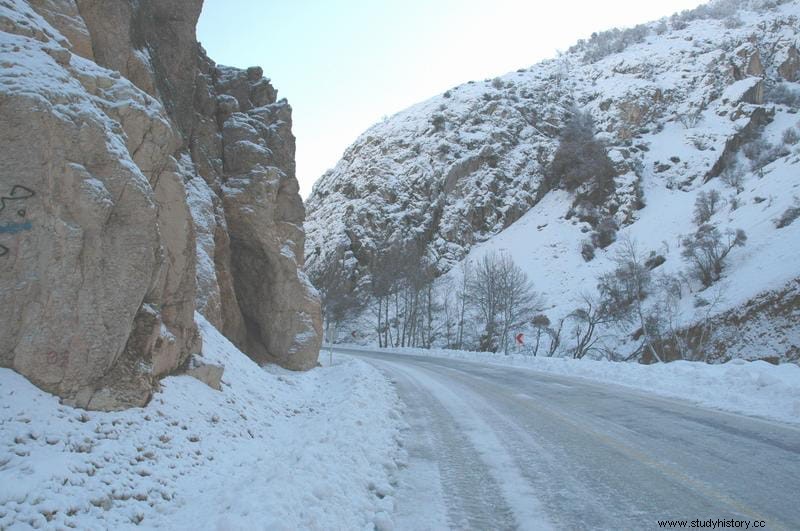
The Macedonians were made with a rich loot, since in Persepolis the royal treasure was guarded, for whose transfer hundreds of camels were needed. One portion served to pay thirty talents to the pastor as a reward; another, to compensate almost a thousand Greeks who lived in the city and whose hand Darius III had ordered to cut off a hand as an example, something that infuriated Alexander and surely led him to allow it to be burned, which was officially presented as revenge for the destruction of Athens.
Not a few authors consider the battle of the Persian Gate as Alexander's most decisive victory, since he seized Persepolis and its economic resources, giving a blow with its destruction. It was also the most critical, as he spent a month immobilized and bordering on disaster... from which, once again, he managed to get out with his characteristic combination of genius and luck.
